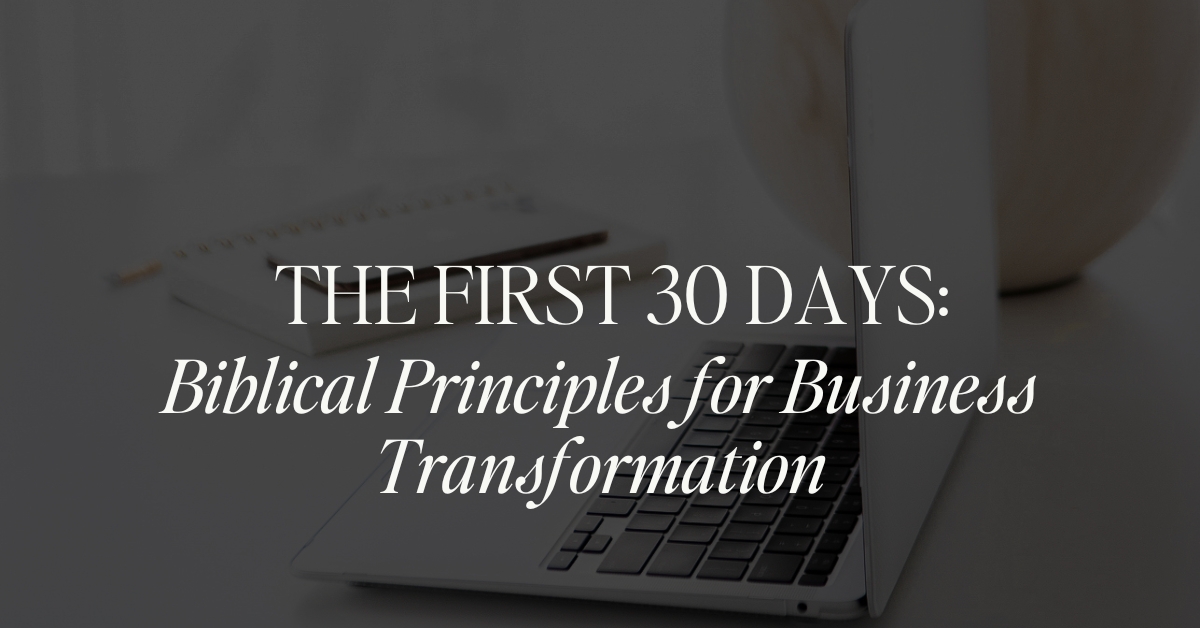The First 30 Days: Biblical Principles for Business Transformation
When it comes to meaningful business transformation, the initial month sets the foundation for everything that follows. It’s during these crucial first 30 days that momentum is built, habits are formed, and the trajectory for sustainable change is established.
Many entrepreneurs approach transformation by focusing exclusively on tactics and strategies. While these certainly matter, I’ve found that the most powerful business transformations begin with something deeper—timeless principles that align your actions with enduring wisdom.
In my years guiding purpose-driven entrepreneurs through business evolution, I’ve observed that ancient principles found in biblical wisdom offer remarkably relevant frameworks for modern business transformation. These principles aren’t just spiritual concepts—they’re practical approaches to creating sustainable change that honors both your business goals and your deepest values.
Let’s explore five powerful principles that can guide your first 30 days of business transformation, creating a foundation for growth that’s both meaningful and sustainable.
1. Begin with Clarity of Purpose
“Where there is no vision, the people perish.” – Proverbs 29:18
The most successful business transformations start with absolute clarity about your destination. Without a compelling vision, even the most disciplined implementation will eventually falter. This ancient wisdom reminds us that vision precedes thriving—in life and in business.
In practical terms, clarity of purpose means:
- Defining what success looks like beyond just financial metrics
- Understanding why this transformation matters to you personally
- Identifying how the changes will impact those you serve
- Articulating the values that will guide your transformation process
- Creating a clear picture of your desired future state
Before jumping into action steps, invest time in developing a written vision statement for your transformation. Research shows that people who write down their goals are 42% more likely to achieve them. Your vision statement should answer not just what you want to change, but why it matters and how it aligns with your deeper purpose.
Implementation Step: Set aside a focused 2-hour block during your first three days to craft a comprehensive vision statement for your business transformation. Write it down, refine it until it resonates deeply, and place it where you’ll see it daily.

2. Build Systems That Support Stewardship
“Whoever can be trusted with very little can also be trusted with much.” – Luke 16:10
Successful business transformation requires thoughtful stewardship of your most precious resources—your time, energy, creativity, and relationships. This principle reminds us that how we manage what we have today determines our capacity for greater impact tomorrow.
Effective stewardship systems include:
- Time blocking that aligns your schedule with your highest priorities
- Energy management practices that optimize your peak productivity periods
- Decision-making frameworks that filter opportunities through your core values
- Resource allocation processes that maximize impact while minimizing waste
- Accountability structures that ensure consistent follow-through
The first 30 days of transformation provide the perfect opportunity to establish systems that enable sustainable progress. Rather than relying on willpower alone, create supportive structures that make aligned action the path of least resistance.
Implementation Step: Identify your three most critical resources for this transformation and design one simple system to optimize each. For example, create a time-blocking template for your ideal week, establish an energy management ritual, or develop a values-based decision filter.
3. Practice Consistent, Imperfect Action
“Sow your seed in the morning, and at evening let your hands not be idle, for you do not know which will succeed, whether this or that, or whether both will do equally well.” – Ecclesiastes 11:6
One of the most significant barriers to business transformation is perfectionism—the belief that actions must be flawless to be worthwhile. This timeless wisdom offers an alternative approach: consistent sowing across multiple areas, recognizing that some efforts will bear fruit while others may not.
Consistent, imperfect action means:
- Prioritizing progress over perfection in your daily activities
- Establishing manageable daily practices rather than sporadic heroic efforts
- Recognizing that some initiatives will succeed while others may fail
- Learning and adapting as you go rather than waiting for perfect knowledge
- Maintaining momentum even when results aren’t immediately visible
The first 30 days of transformation are about building momentum through consistent action, not achieving perfection. By embracing imperfect progress, you overcome the paralysis that derails many transformation efforts.
Implementation Step: Identify one key action for your transformation that you can perform daily, even if imperfectly, during these first 30 days. Make this your non-negotiable minimum daily requirement, no matter how busy or challenging the day becomes.
4. Build in Sacred Pause Points
“Be still, and know…” – Psalm 46:10
In our action-oriented business culture, we often undervalue the transformative power of strategic pauses. Yet research consistently shows that our most profound insights and effective course corrections often come during moments of reflection, not constant activity.
Effective pause points in business transformation include:
- Regular reflection rituals to assess what’s working and what needs adjustment
- Scheduled thinking time for strategic consideration of challenges and opportunities
- Brief mindfulness practices that enhance decision-making quality
- Weekly review processes to celebrate progress and refine approaches
- Intentional disconnection from digital distractions to enable deeper thought
Without these sacred pause points, transformation efforts often become reactive rather than intentional, causing us to miss critical insights that could enhance our effectiveness.
Implementation Step: Schedule three specific pause points in your weekly calendar for the next 30 days—a daily 10-minute reflection, a mid-week 30-minute assessment, and a more comprehensive end-of-week review. Protect these appointments with the same diligence you would client meetings.
5. Cultivate Supportive Relationships
“As iron sharpens iron, so one person sharpens another.” – Proverbs 27:17
No significant business transformation happens in isolation. This principle acknowledges that we need others to challenge our thinking, encourage our efforts, and help us see our blind spots. The quality of relationships surrounding your transformation effort will significantly impact its success.
Strategic relationship cultivation includes:
- Identifying mentors or guides who have successfully navigated similar transformations
- Creating accountability partnerships to maintain momentum during challenging periods
- Building a peer community that understands and supports your transformation journey
- Developing relationships with those who complement your weaknesses
- Minimizing time with those who consistently undermine your transformation efforts
The first 30 days are crucial for establishing the relationship infrastructure that will support your longer-term transformation. This doesn’t necessarily mean adding new relationships, but it does mean being strategic about leveraging existing connections.
Implementation Step: Identify three key relationships for your transformation journey—a mentor figure who provides wisdom, an accountability partner who offers support, and a community that provides perspective. Reach out to each within your first week and establish clear expectations for how they can support your journey.

Designing Your First 30 Days
Meaningful business transformation doesn’t happen by accident. It requires intentional design, especially during these crucial first 30 days. By applying these timeless principles, you create a foundation for change that’s both effective and sustainable.
Your transformation blueprint might look like this:
1ˢᵗ-3ʳᵈ Days: Vision Clarity
- Develop your written transformation vision
- Identify core values that will guide your process
- Define specific success metrics beyond financial outcomes
4ᵗʰ-10ᵗʰ Days: System Development
- Create your ideal weekly schedule with protected time blocks
- Establish morning and evening rituals for consistent action
- Design your decision-making filter based on core values
11ᵗʰ-20ᵗʰ Days: Consistent Implementation
- Execute your daily non-negotiable transformation activities
- Implement your scheduled pause points for reflection
- Begin cultivating your supportive relationship network
21ˢᵗ-30ᵗʰ Days: Assessment and Refinement
- Review initial progress against your defined metrics
- Identify and address emerging challenges or resistance
- Celebrate small wins and refine your approach as needed
Remember that transformation is ultimately about progress, not perfection. These first 30 days aren’t about complete reinvention but about establishing the foundation and momentum for sustained positive change.
Ready for Your Business Transformation Journey?
If you’re prepared to apply these principles in your business, our 30-Day Business Transformation Framework provides the structure, guidance, and community to support your journey.
Through this practical, implementation-focused program, you’ll:
- Develop a compelling vision that aligns with your deepest values
- Create systems that support sustainable progress
- Establish daily practices that build transformation momentum
- Learn effective reflection techniques that enhance decision quality
- Connect with a community of like-minded entrepreneurs on similar journeys
Click here to learn more and start your 30-day transformation with purpose and confidence.
What’s one principle from this article that resonates most with your current business situation? Share your thoughts in the comments below—I’d love to hear which aspect of transformation you’re focusing on right now.

